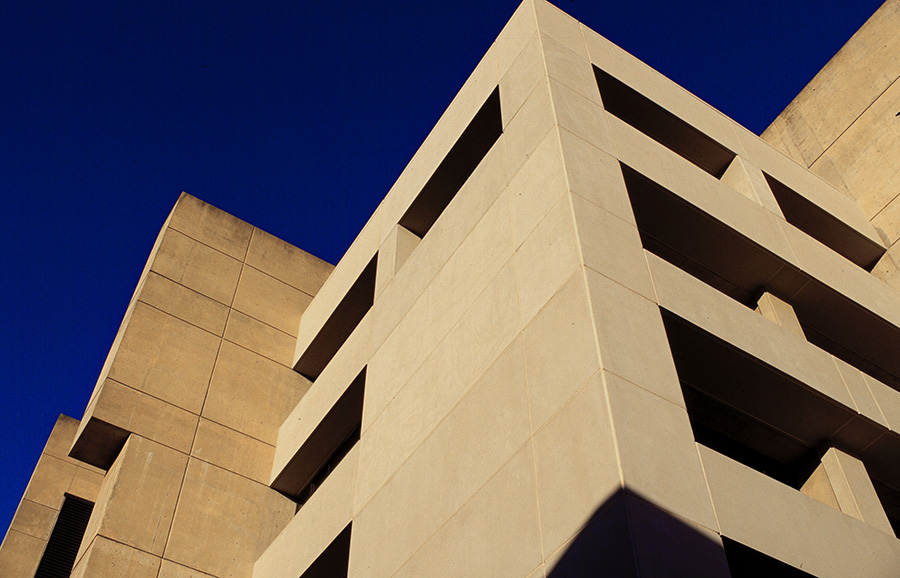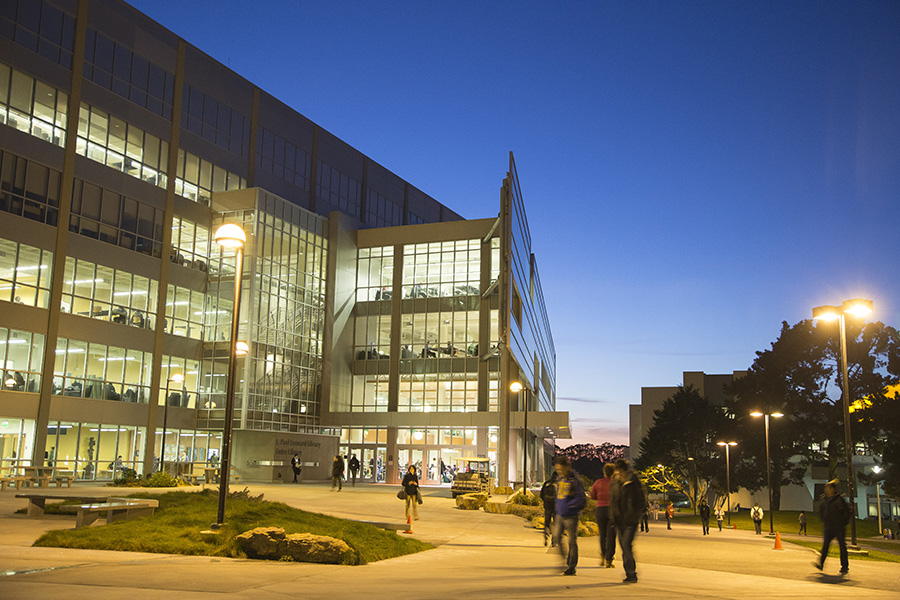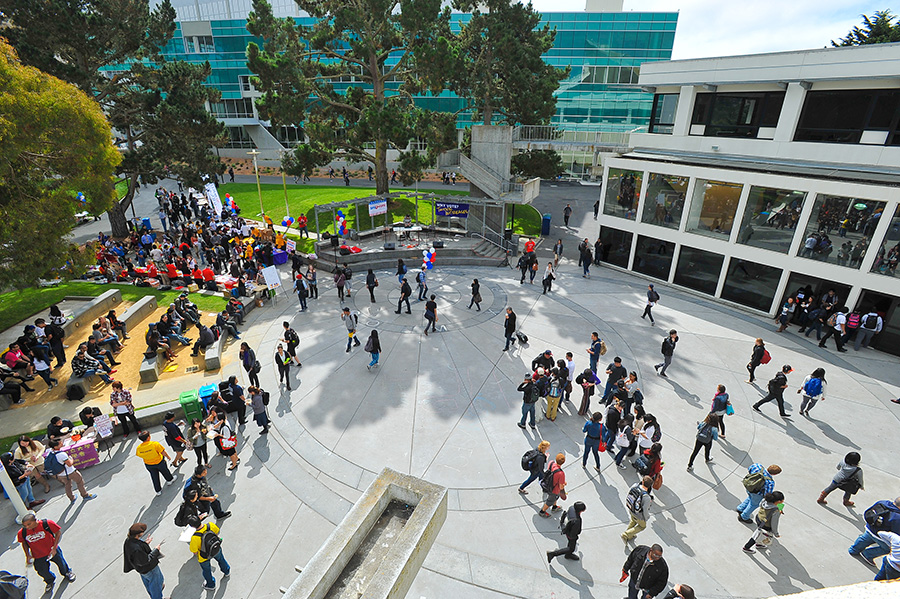College of Science & Engineering
Engineering is about building propulsion systems that send people to Mars, making zero-emission cars that run on electricity, creating a medical device that removes a blood clot in a beating heart, establishing a super-cold storage system to store vaccines, constructing structures and transportation systems that are safe and eco-friendly, and coming up with the next ubiquitous, low-power-consumption communications system that connects humans across the world at low cost.
Some highlights:
- EE (Electrical Engineering) develops strong theoretical foundation and hands on training in electronics design, testing and manufacturing.
- Engineering students lead projects to support frontline medical workers in the fight against COVID-19.
- EE faculty are first-rate teacher-scholars from top PhD programs with outstanding industry experiences.
- EE program features SF State Scholars program which students can earn BS and MS in 5 years.
- The EE program has a complete suite of electronics design software from Cadence, Mentor Graphics and Synopsys.
- The EE program is equipped with the state-of-art electronics prototyping tools, e.g., soldering station with reflow ovens, and operating scope.
- The EE program has an extensive list of testing equipment, including temperature controlled probe station, high speed network analyzer, pattern generator and logic analyzer.
- EE Alums work for local industries, e.g., Tesla, Intel, Apple and Ti, as well as public service sectors, e.g., PG&E, Bart, MUNI, and SF Airport.
- EE graduates are recipients of competitive scholarships, e.g. NSF Graduate Research Fellowships.
- EE Alums are accepted into first-rate graduate programs such as UCs, Duke Univ, Virginia Tech. and so on.
Access the list of the major requirements to better understand the structure of the major.
The roadmap puts all of your graduation requirements into an easy-to-follow semester-by-semester plan so you know what to take to stay on track. Whether you are a freshman or a transfer student, you'll be able to find a roadmap that best fits you.
Besides your major requirements, students must complete their GE and University requirements. Be sure to make sure you've completed all of these requirements for graduation.
To learn more about this major, check out the major department’s website below. You can also find out how you can access their faculty advisors who can assist you not just with course choices, but also answer questions about the field and discuss your career plans.
School of Engineering
Science & Engineering Innovation Center, SEIC 311
Phone: (415) 338-1228
Email: engrasst@sfsu.edu
Website: https://engineering.sfsu.edu/, https://engineering.sfsu.edu/electrical-engineering
Student Services Coordinator: Raul Contreras III
Freshmen Student Advising Information
After choosing “Basic Subjects” GE courses in Steps 1-3 of your Orientation process (if you haven’t done so, log onto your Orientation Profile page to follow the “Pre-Orientation Advising Module”), STEP 4 Choosing Major Classes will show you if there are any classes you can take to satisfy major requirements for your first and/or second semester.
Once you have determined your Roadmap above, review the first section below and write down any course recommendations based on your corresponding major roadmap on your Freshmen Class Planner worksheet.
First Semester Course Recommendations
For all Roadmaps
| Major Class & Title | Units | Other Requirement Area(s) Met |
| ENGR 100 - Introduction to Engineering | 1 unit | Major Core |
| MATH 226 - Calculus I#1, #2, #3 OR MATH 197 - Prelude to Calculus I#3 OR MATH 199 – Pre-Calculus#3 |
4 units 3 units 4 units |
Major Core Prerequisite for MATH 226 Prerequisite for MATH 226 |
| If there are any course(s) listed above, please write each class into the space provided in “Step 4” of your Freshmen Class Planner. |
Advisor Footnotes:
- #1 AP Calculus AB or AB subscore of 4 or 5 (but not 3) satisfies Math 226 requirement (4 units)
- #2 Prerequisite for MATH 226 is high school pre-calculus with “B” or better, or high school calculus with a grade of “C” or better; or a college-level pre-calculus course with a “C” or better (i.e. MATH 198 or MATH 199)
- #3 Take the First-Year Math Advising Exercise before choosing this course
- #4 1-unit Supplemental Instruction courses (SCI) are offered for these classes as additional support. These courses can be found in the SFSU Class Schedule (https://webapps.sfsu.edu/public/classservices/classsearch) by searching for the "SCI" department prefix.
If any of the class(es) above ends up being FULL by the time you register, consider choosing more General Education courses to build up your schedule
- There are no other alternate courses for this major
- If more units are needed, consider General Education courses from the areas suggested in the "GE Area Recommendations" section below
Once you have made your course choices for Steps 1-4, you may already have between 12-15 units chosen for your first semester—about 4 to 5 classes.
If more units are needed, you will proceed to "Step 5 - Choosing GE Courses" from your Orientation Advising Module after considering the following recommendations...
| GE Area | Advisor Notes |
| A1 Oral Communication | Covered in “Step 3” on the Freshmen Class Planner |
| A2 Written English Communication | Covered in “Step 1” on the Freshmen Class Planner |
| A3 Critical Thinking | Covered in “Step 3” on the Freshmen Class Planner |
| B1 Physical Science | Met within major core courses |
| B2 Life Science | Choose any |
| B3 Laboratory Science | Met within major core courses |
| B4 Quantitative Reasoning | Covered in “Step 2” on the Freshmen Class Planner |
| C1 Arts | Choose any |
| C2 Humanities | Choose any#1 |
| D Social Sciences | Choose any#1 |
| D US History | Choose any#1 |
| E Lifelong Learning & Self-Development (LLD) | Covered in “Step 1” on the Freshmen Class Planner |
| F Ethnic Studies | Choose any#1 |
| US/CA Government | Choose any |
Advisor Footnotes:
- #1 Metro Academy students—these areas may be covered in your Metro Ed Plan
Second Semester Course Recommendations
If MATH 226 is completed in the first semester…
| Major Class & Title | Units | Other Requirement Area(s) Met |
|---|---|---|
|
CHEM 115 – General Chemistry I: Essential Concepts of Chemistry OR#1 CHEM 180 - Chemistry for Energy and the Environment |
5 units
3 units |
Not GE
GE: Area B1 & B3 |
| ENGR 271 – Introduction to MATLAB | 1 unit | Major Core |
| MATH 227 - Calculus II | 4 units | Major Core |
|
PHYS 220 - General Physics with Calculus I#2 & PHYS 222 - and General Physics with Calculus I Laboratory#2 |
4 units | Major Core GE: Area B1 & B3 |
If MATH 226 is NOT completed in the first semester…
| Major Class & Title | Units | Other Requirement Area(s) Met |
|---|---|---|
|
CHEM 115 – General Chemistry I: Essential Concepts of Chemistry OR#1 CHEM 180 - Chemistry for Energy and the Environment |
5 units
3 units |
Not GE
GE: Area B1 & B3 |
| MATH 198 – Prelude to Calculus II#3 OR MATH 226 - Calculus I#4, #5 |
4 units OR 4 units |
Prerequisite for MATH 226 Major Core Course |
Advisor Footnotes:
- #1 Most Engineering students take CHEM 180 instead of CHEM 115
- #2 Take both Physics Lab and Lecture at the same time
- #3 Prerequisite for MATH 198 is MATH 197 with a “C” or better
- #4 AP Calculus AB (or AB subscore), or BC score of 4 or 5 (but not 3) satisfies Math 226 requirement (4 units)
- #5 Prerequisite for MATH 226 is high school pre-calculus with “B” or better, high school calculus with a grade of “C” or better; or a college-level pre-calculus course with a “C” or better (i.e. MATH 198 or MATH 199)
If any of the class(es) above ends up being FULL by the time your register, consider choosing more General Education courses to build up your schedule
| AP exam (score 4 or 5) | Course Equivalencies |
|---|---|
| Calculus AB (or subscore) or BC | Math 226 (4 units) |
| Physics C: Mechanics | PHYS 220 and 222 (4 units) |
Engineering has mandatory advising every semester during the advising weeks in November in the Fall semester & in April in the Spring Semester.
Some career fields are:
- Digital/analog circuits designers
- Power electronics engineers
- Semiconductor process engineers
- Very Large System Integration (VLSI) engineers
- Communications engineers
- Power engineers
- Reliability engineers
- Robotics engineers
- Controls engineers
Transfer Student Advising Information
Please see the box above labeled “Major Curriculum/Roadmaps & GE/University Requirements” for information on what courses to take in your first semester at SF State. View our Frequently Asked Questions for Transfers for helpful tips and additional information.




